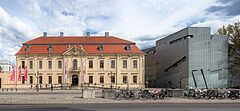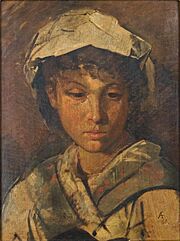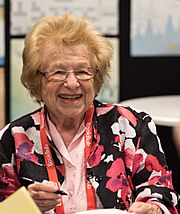Leo Baeck Institute New York facts for kids
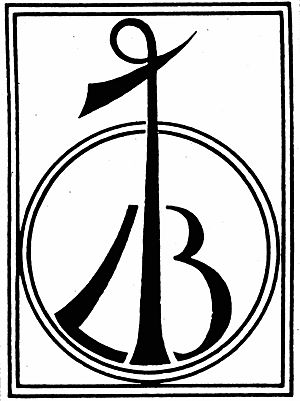 |
|
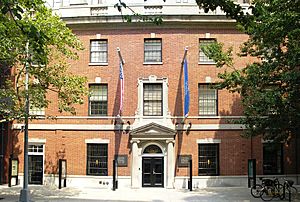
The Leo Baeck Institute in the Center for Jewish History on West 16th Street in Manhattan
|
|
| Lua error in Module:Location_map at line 420: attempt to index field 'wikibase' (a nil value). | |
| Established | 1955 |
|---|---|
| Location | 15 West 16th Street New York City, New York |
| Type | Research institute |
| Historian | Dr. Frank Mecklenburg |
| Public transit access | Subway: 14th Street – Union Square |
The Leo Baeck Institute New York (LBI) is a special place in New York City that studies the history and culture of Jewish people from Germany. It was started in 1955.
The LBI is one of three research centers created by a group of Jewish people who had moved from Germany. The other institutes are in Jerusalem and London. All three work together under one main board.
The LBI is also a main partner of the Center for Jewish History. It has a huge library and archive in New York City. These collections hold many important materials about German-speaking Jewish history. This includes everything from their early beginnings to the Holocaust and up to today.
Since 1978, the institute has given out the Leo Baeck Medal. This award honors people who have helped keep the spirit of German-speaking Jewish culture alive. This includes work in art, education, politics, and charity.
Contents
History of the Institute
The Leo Baeck Institute New York was founded in 1955. It was one of three research centers created by Jewish people who had left Germany. They met at a conference in Jerusalem to start these institutes. The other two are the Leo Baeck Institute Jerusalem and the Leo Baeck Institute London. All three institutes work together.
Under its first director, Max Kreutzberger, the LBI New York became known for its library and archives. The library started with books that had been taken from Jewish libraries during World War II. These books were later found by Allied forces and returned to Jewish libraries.
Later in the 1950s, the LBI began to buy books and old papers from booksellers in New York. They also asked German-Jewish people living in New York to donate their personal papers and books. By 1960, the LBI New York had moved to a new building. Its collection included about 30,000 books, 250 unpublished stories, and many important historical records.
Over the years, the LBI received many important donations. These included the writings of famous people like the German philosopher Constantin Brunner. Other important donations came from the writer Fritz Mauthner and the philosopher Franz Rosenzweig.
By the 1990s, the LBI's building was too small for its growing collections. The LBI president, Ismar Schorsch, started talking with other Jewish research centers. They wanted to find a way to share a larger building. In 1993, the LBI joined with three other groups. These were the YIVO Institute for Jewish Research, the Yeshiva University Museum, and the American Jewish Historical Society.
They planned to create the Center for Jewish History together. This new center would be in a building on West 16th Street in Manhattan. The Leo Baeck Institute New York moved its offices and collections to the Center for Jewish History in 2000.
Today, the LBI shares many things with its partners at the Center for Jewish History. This includes storage for books, reading rooms, and labs for digital and conservation work. They also share spaces for events and exhibitions.
LBI's Presence in Germany
In the 1990s, the Leo Baeck Institute New York became even closer with Germany. It started getting more money from the German government and private groups.
Discussions about the LBI having an official presence in Germany began in the 1970s. In 1998, W. Michael Blumenthal, who was German-born and American, suggested that the LBI open an office at the new Jewish Museum Berlin.
In late 1999, the LBI agreed with the Jewish Museum Berlin to open an office there. This office would have copies of the LBI archives on microfilm. This made it easier for researchers in Europe to access the collections. In 2013, the LBI also opened an administrative office in Berlin.
What the LBI Has
The Leo Baeck Institute New York has a library, an archive, and an art collection. It also has an exhibition center. Its offices and collections are all located in the Center for Jewish History. This center is a partnership where different Jewish organizations share one location. They have their own leaders and money, but they share resources.
- LBI's Library Collection: This collection has 80,000 books. It includes old works from the 16th century about banning Jewish books. It also has new research about German-Jewish studies.
- LBI Archive: This archive holds over 4,000 feet of materials. These include family papers, community histories, and personal letters. There are also records about family trees, businesses, and public life. These materials cover German-speaking Jews from the 18th century to after World War II.
- LBI Art Collection: This collection has 8,000 pieces of art. It includes works created or collected by German-speaking Jews. The art ranges from the 16th to the 20th centuries.
Special Collections
Most of the Leo Baeck Institute New York's archives are personal papers from German-speaking Jews. The library has more than 80,000 books.
In October 2012, the LBI New York announced a big project called DigiBaeck. They had digitized almost all of their archive materials. They also digitized a large part of their art collections and rare books.
The DigiBaeck online collection now includes nearly 75% of the LBI's holdings. This includes archive materials, memoirs, and manuscripts. It also has art, objects, books, newspapers, photos, and audio recordings.
Collection Highlights
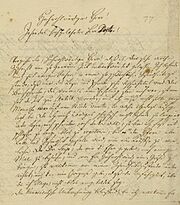
- First Editions: The collection includes first editions of books by the philosopher Moses Mendelssohn. It also has works by the poet and writer Heinrich Heine.
- Early Writings: There are writings from the early 16th century by important figures like Martin Luther and Erasmus. The library also has a full collection of newspapers and magazines published from the 18th to 20th centuries.
- Rare Books: The rare book collection has special limited editions of art portfolios from the 20th century. It also includes several illustrated 18th-century books about Jewish customs.
Digitization Projects
- Freimann Collection: The LBI worked with Frankfurt University Library to digitize parts of the Wissenschaft des Judentums (Science of Judaism). This project was funded by grants from the National Endowment for the Humanities and the German Research Foundation.
Notable People in the Archive
- Karl Otten, a German writer and broadcaster known for his expressionist works.
Fellowships, Seminars, and Medals
Besides collecting and preserving historical items, the Leo Baeck Institute New York also supports learning. It offers special fellowships for scholars who study German-Jewish history. It also holds seminars and creates exhibits for the public.
Each year, the Leo Baeck Institute New York gives out the Leo Baeck Medal. This medal is given to people whose humanitarian work helps promote tolerance and fairness. It also honors those who have helped keep the spirit of German-speaking Jewish culture alive. This includes work in culture, education, politics, and charity. It is the highest award the institute gives.
Some famous people who have received this medal include:
- German Chancellor Angela Merkel
- German Ambassador Wolfgang Ischinger
- Businessman and journalist Mathias Dopfner
- Economist and former president of the World Bank James D. Wolfensohn
- German Minister of the Interior Otto Schily
- Holocaust survivor Dr. Ruth Westheimer (Dr. Ruth)
- German President Johannes Rau
- Business leader and political adviser W. Michael Blumenthal
Exhibitions
The LBI often hosts exhibitions to share its collections and research with the public.
- Destination Shanghai: The Jewish Community of Shanghai, 1936-1949. This exhibit ran from May 2012 to April 2013.
- Transcending Tradition: Jewish Mathematicians in German-Speaking Academic Culture. This exhibit was open from July 29, 2013, to January 5, 2014.
See also
- Leo Baeck
- Leo Baeck Medal


